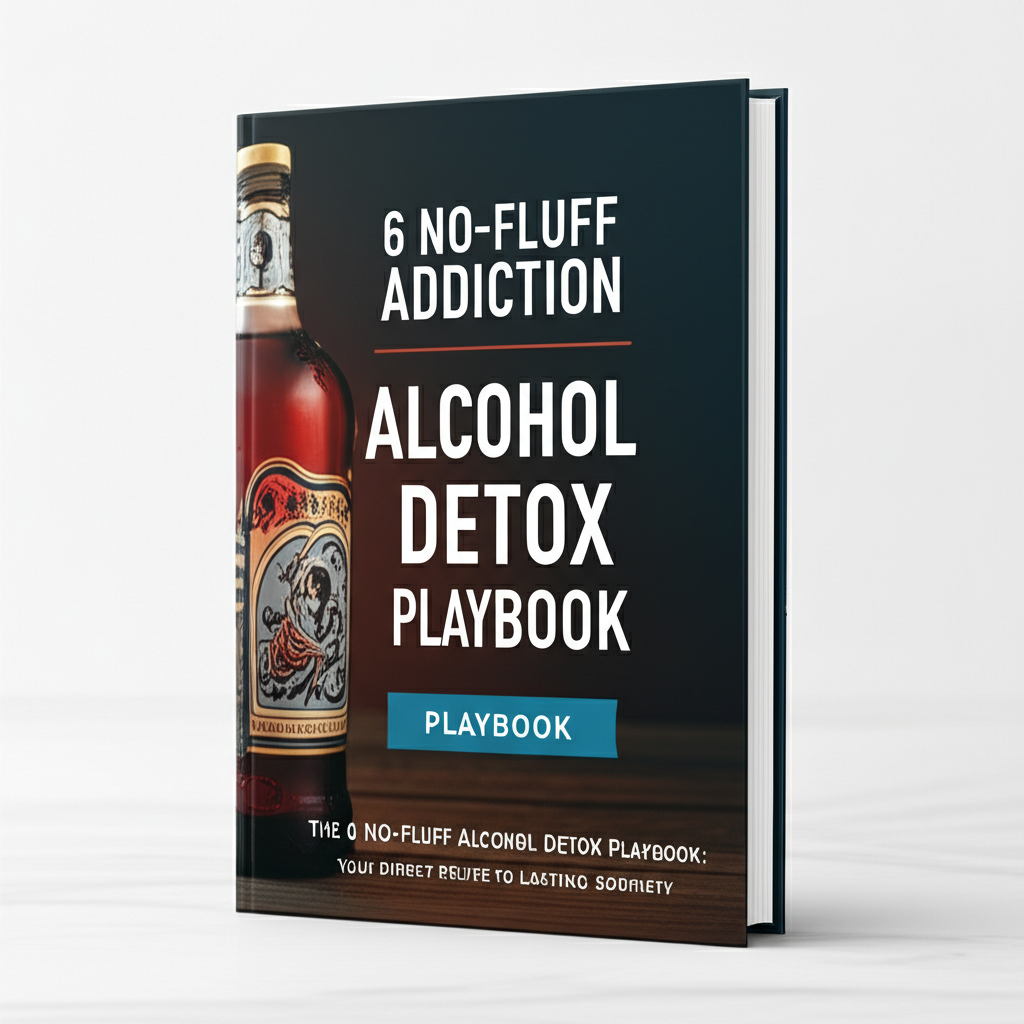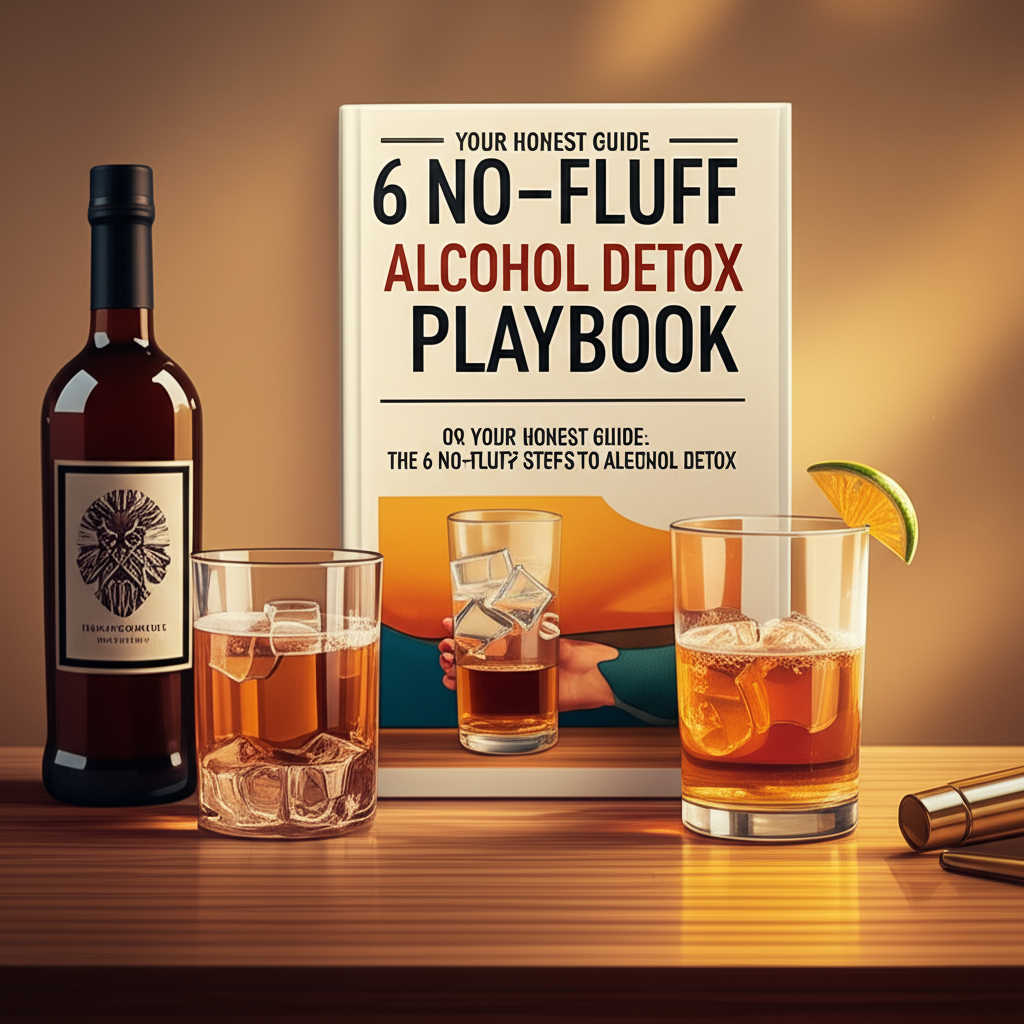The journey to sobriety is not a single leap but a series of deliberate, often challenging, steps. The initial phase – alcohol detox – is particularly critical. It’s the process of ridding the body of alcohol and managing the potentially dangerous withdrawal symptoms that follow. While the prospect can be intimidating, understanding the process and having a clear roadmap can transform fear into empowering action.
This article provides a comprehensive, actionable roadmap for navigating alcohol detox. It’s designed to demystify the process, highlight crucial safety considerations, and guide you or a loved one toward a safer, more sustainable path to recovery. This isn’t just about stopping drinking; it’s about building a foundation for a healthier, alcohol-free life.
Roadmap 1: Laying the Foundation – Preparation & Professional Consultation
The first phase of any successful alcohol detox begins long before the last drink. It’s about meticulous preparation, realistic expectations, and, most importantly, professional medical consultation. This stage is crucial for ensuring safety and setting the groundwork for long-term success.
Acknowledging the Problem & Desiring Change
The very first, and arguably most difficult, step is a genuine internal acknowledgment of the problem and a sincere desire to change. This isn’t something that can be forced; it must come from within.
- Self-Reflection: Take time to honestly assess the impact alcohol has had on your life, relationships, health, and finances. What are your motivations for stopping? Write them down.
- Set Clear Intentions: Articulate your goal. Is it complete abstinence? Is it to understand the underlying reasons for your drinking? Having a clear purpose will serve as an anchor during challenging moments.
- Embrace Vulnerability: It takes immense strength to admit you need help. This vulnerability is the gateway to healing.
The Critical First Step: Medical Consultation
Attempting to detox from alcohol without medical supervision can be extremely dangerous, even life-threatening. Alcohol withdrawal syndrome (AWS) can manifest with severe symptoms, including seizures and a condition called delirium tremens (DTs). A medical professional can assess your individual risk factors and recommend the safest course of action.
-
Why Medical Consultation is Non-Negotiable:
- Accurate Assessment: A doctor can evaluate your drinking history, overall health, co-occurring mental health conditions, and previous withdrawal experiences to determine the severity of potential withdrawal.
- Risk Mitigation: They can identify risk factors for severe withdrawal symptoms, such as delirium tremens or seizures, and prescribe medications to manage these risks.
- Personalized Plan: Based on their assessment, they will recommend the most appropriate detox setting (inpatient, outpatient, or, in rare cases, a highly supervised home detox).
- Medication Management: Medications like benzodiazepines (e.g., Valium, Ativan, Librium) are often used to reduce anxiety, prevent seizures, and alleviate other withdrawal symptoms, making the process safer and more comfortable. These can only be prescribed by a doctor.
- Nutritional Guidance: Alcohol abuse often leads to nutritional deficiencies. A doctor can recommend supplements (especially B vitamins) to support your body during detox.
-
Who to Consult:
- Your primary care physician.
- An addiction specialist.
- An emergency room doctor (if symptoms are already severe).
Building Your Support System
You don’t have to face detox alone. A robust support system is a powerful asset, providing emotional encouragement, practical help, and accountability.
- Identify Key Supporters: This could be a trusted friend, a family member, a mentor, or a therapist. Choose individuals who are empathetic, non-judgmental, and genuinely committed to your well-being.
- Communicate Your Needs: Clearly explain what you’re going through and how they can best support you. This might involve:
- Being available for phone calls.
- Helping with practical tasks (groceries, childcare).
- Attending appointments with you.
- Simply listening without judgment.
- Professional Support: Beyond medical doctors, consider engaging with therapists, counselors, or addiction specialists who can provide psychological support and guidance through the emotional challenges of detox and early recovery.
Practical Preparations
Once you have medical clearance and a support system in place, some practical preparations can ease the transition into detox.
- Clear Your Environment: Remove all alcohol from your home. This might seem obvious, but it eliminates immediate temptation.
- Plan for Time Off: Detox can be physically and emotionally draining. If possible, arrange for time off work or other responsibilities.
- Prepare Nutritious Foods: Stock your pantry with easy-to-prepare, healthy meals and snacks. Staying nourished is crucial for recovery.
- Stay Hydrated: Have plenty of water, electrolyte drinks, and clear broths readily available. Dehydration can worsen withdrawal symptoms.
- Arrange Transportation: If you’re going to an inpatient facility, ensure you have a ride. If you’re doing an outpatient detox, arrange for someone to drive you to appointments, especially if you’re experiencing symptoms that impair your ability to drive.
Roadmap 2: Navigating the Detox Journey – Safety, Comfort, and Care
This phase is the actual physical process of withdrawing from alcohol. It’s where the body begins to heal, and symptoms are actively managed. The setting for this journey is paramount to safety and success.
Understanding Alcohol Withdrawal Syndrome (AWS)
AWS is the body’s reaction to the absence of alcohol after prolonged or heavy use. Alcohol is a central nervous system depressant; chronic use causes the brain to adapt by increasing excitatory neurotransmitters to compensate. When alcohol is removed, these excitatory neurotransmitters become overactive, leading to a range of symptoms.
- Typical Timeline & Symptoms (Varies by individual):
- 6-12 hours: Minor withdrawal symptoms begin. Headaches, nausea, vomiting, tremors (shakes), anxiety, sweating, insomnia.
- 12-24 hours: Alcoholic hallucinations may occur (seeing, hearing, or feeling things that aren’t there), though often still aware they aren’t real.
- 24-48 hours: Withdrawal seizures are a significant risk.
- 48-72 hours (and up to a week): Delirium Tremens (DTs) can occur. This is a severe, life-threatening form of withdrawal characterized by rapid heart rate, high blood pressure, confusion, disorientation, severe agitation, fever, and profound hallucinations.
- Why Medical Supervision is Key: Only medical professionals can accurately predict and manage these potentially fatal symptoms.
Option 1: Medically Supervised Detox (The Safest and Most Recommended Path)
For most individuals with alcohol dependence, medically supervised detox is the gold standard. It provides a safe environment where medical professionals can monitor your vital signs, administer necessary medications, and intervene immediately if complications arise.
- Inpatient Detox Centers:
- What it is: A residential facility where you stay for the duration of the detox process (typically 3-7 days).
- Benefits:
- 24/7 Medical Care: Constant monitoring by doctors and nurses.
- Medication Management: Timely administration of medications to alleviate symptoms and prevent complications.
- Safe Environment: Free from alcohol and external triggers.
- Nutritional Support: Balanced meals and hydration.
- Emotional Support: Access to counselors and therapists to help process initial emotions.
- Who it’s for: Highly recommended for individuals with a history of heavy drinking, previous severe withdrawal symptoms, co-occurring medical or mental health conditions, or those who lack a stable home environment.
- Hospital-Based Detox:
- What it is: Detoxification within a hospital setting, often in an emergency room or a dedicated detox unit.
- Benefits: Similar to inpatient centers but with immediate access to advanced medical interventions for severe complications.
- Who it’s for: Individuals experiencing severe withdrawal symptoms upon presentation, or those with very complex medical histories.
- Outpatient Medical Detox:
- What it is: Attending regular appointments at a clinic or doctor’s office for medication and monitoring while living at home.
- Benefits: Allows you to remain in your home environment and continue with some daily routines.
- Who it’s for: Individuals with mild to moderate alcohol dependence, good overall health, a strong support system at home, and reliable transportation for daily appointments. Crucially, this should only be undertaken with strict medical approval and oversight.
Option 2: Home Detox (Use Extreme Caution and Only Under Medical Guidance)
While seemingly convenient, attempting to detox from alcohol at home without professional medical guidance is highly risky and generally discouraged. It should only be considered for individuals with very mild alcohol dependence, after a thorough medical evaluation, and with a clear, medically supervised plan.
- When it might be considered (with doctor’s approval):
- Very light, short-term dependence.
- No history of previous severe withdrawal symptoms (seizures, DTs).
- No co-occurring medical or mental health conditions.
- A stable, supportive home environment with a responsible adult present 24/7.
- Daily check-ins with a doctor who has prescribed appropriate medications.
- The Dangers of Unsupervised Home Detox:
- Unpredictable Severity: Withdrawal symptoms can escalate rapidly and unexpectedly.
- Lack of Immediate Intervention: Without medical personnel present, a seizure or the onset of DTs can quickly become fatal.
- Relapse Risk: The temptation to drink to alleviate discomfort is very high when alcohol is accessible or easily obtained.
- Nutritional Deficiencies: Managing proper nutrition and hydration can be difficult when feeling unwell.
Managing Symptoms & Staying Hydrated
Regardless of the detox setting, certain general strategies can help manage discomfort (under medical guidance).
- Medication Adherence: Take all prescribed medications exactly as directed by your doctor. Do not self-medicate with other substances.
- Hydration: Drink plenty of water, herbal tea, clear broths, and electrolyte-rich beverages. Avoid caffeine and sugary drinks.
- Nutrition: Eat small, bland, nutritious meals if you can. Focus on fruits, vegetables, lean proteins, and whole grains.
- Rest: Allow your body ample time to rest and recover. Sleep can be difficult during withdrawal, but prioritize relaxation.
- Comfort Measures: Use cold compresses for fever, warm baths for muscle aches, and engage in calming activities like reading or listening to music (if able).
- Monitor Symptoms: Pay close attention to your symptoms and report any concerning changes immediately to your medical team.
Roadmap 3: Beyond Detox – Building a Sustainable Sober Life
Completing detox is a monumental achievement, but it’s just the first step on a lifelong journey of recovery. The physical absence of alcohol doesn’t magically erase the underlying issues or learned behaviors associated with addiction. This phase focuses on building the tools, support systems, and coping mechanisms necessary to maintain sobriety and thrive.
The Importance of Aftercare
Aftercare refers to the ongoing support and treatment received after the initial detox phase. It’s the bridge from immediate physical recovery to long-term psychological and emotional healing.
- Why Aftercare is Essential:
- Addresses Root Causes: Detox cleanses the body, but aftercare addresses why you drank in the first place.
- Develops Coping Skills: Teaches healthy ways to manage stress, triggers, and cravings without resorting to alcohol.
- Prevents Relapse: Provides ongoing support and strategies to navigate challenges and avoid returning to old patterns.
- Builds a Sober Life: Helps integrate new habits, relationships, and purpose into an alcohol-free existence.
Therapy and Counseling
Therapy is a cornerstone of long-term recovery, providing a safe space to explore emotions, learn new behaviors, and develop resilience.
- Individual Therapy:
- Cognitive Behavioral Therapy (CBT): Helps identify and change negative thought patterns and behaviors linked to drinking.
- Dialectical Behavior Therapy (DBT): Focuses on emotional regulation, distress tolerance, interpersonal effectiveness, and mindfulness.
- Motivational Interviewing: Helps individuals explore and resolve ambivalence about change, strengthening their commitment to sobriety.
- Trauma-Informed Therapy: Addresses any underlying trauma that may contribute to addiction.
- Group Therapy:
- Provides a supportive community where individuals can share experiences, receive feedback, and practice new social skills in a safe environment.
- Reduces feelings of isolation and shame.
- Family Therapy:
- Addresses the impact of addiction on family dynamics and helps rebuild trust and communication.
- Educates family members on how to support their loved one in recovery.
Support Groups
Peer support groups offer a unique and invaluable layer of support, connecting individuals with others who understand their struggles firsthand.
- Alcoholics Anonymous (AA): A widely recognized 12-step program based on spiritual principles, focusing on peer support and mutual aid.
- SMART Recovery (Self-Management And Recovery Training): A science-based program that teaches self-empowerment and self-reliance using tools based on CBT and motivational interviewing.
- Refuge Recovery: A Buddhist-inspired program that uses mindfulness and meditation practices to aid in addiction recovery.
- Other Peer Support: Local recovery communities, online forums, and sober living houses can also provide essential connections.
Lifestyle Changes & Holistic Wellness
Sustained sobriety requires a holistic approach that nurtures the body, mind, and spirit.
- Nutrition: Continue to prioritize a balanced diet to heal the body and improve mood.
- Exercise: Regular physical activity can reduce stress, improve sleep, boost mood, and enhance overall well-being.
- Sleep Hygiene: Establish a consistent sleep schedule and create a relaxing bedtime routine to improve sleep quality.
- Mindfulness & Meditation: Practices like meditation, deep breathing, and yoga can reduce anxiety, improve focus, and foster self-awareness.
- New Hobbies & Interests: Discover new passions or rekindle old ones that don’t involve alcohol. This helps fill the void that alcohol once occupied and creates a sense of purpose.
- Stress Management: Identify healthy ways to cope with stress, such as spending time in nature, journaling, or engaging in creative pursuits.
Relapse Prevention Strategies
Relapse is a common part of the recovery journey for many, but it doesn’t have to be the end. Developing proactive strategies can help minimize its likelihood and provide a plan for recovery if it occurs.
- Identify Triggers: Understand what situations, emotions, people, or places might tempt you to drink.
- Develop Coping Mechanisms: Have a repertoire of healthy ways to respond to triggers (e.g., calling a sponsor, going for a walk, practicing mindfulness, using a distraction technique).
- Build a Strong Support Network: Regularly engage with your therapist, support group, and sober friends.
- Create an Emergency Plan: Know who to call, what steps to take, and where to go if you feel on the verge of relapse.
- Practice Self-Compassion: If a slip occurs, view it as a learning opportunity rather than a failure. Seek help immediately and recommit to your recovery plan.
Conclusion: Embracing a New Chapter
Embarking on the journey of alcohol detox and recovery is a testament to immense courage and resilience. This 3-roadmap approach — from meticulous preparation and professional consultation to navigating the detox process safely, and finally, building a robust foundation for a sober life — offers a clear, actionable guide.
Remember, detox is merely the beginning. It clears the physical path, but the real work of recovery lies in the ongoing commitment to therapy, support groups, healthy lifestyle choices, and continuous self-discovery. Each step on this roadmap, though challenging, moves you closer to reclaiming your health, relationships, and overall well-being. You are not alone in this journey. With professional guidance, a strong support system, and unwavering determination, a fulfilling, alcohol-free life is not just a possibility — it’s a tangible reality waiting to be embraced. Take that first courageous step today.








